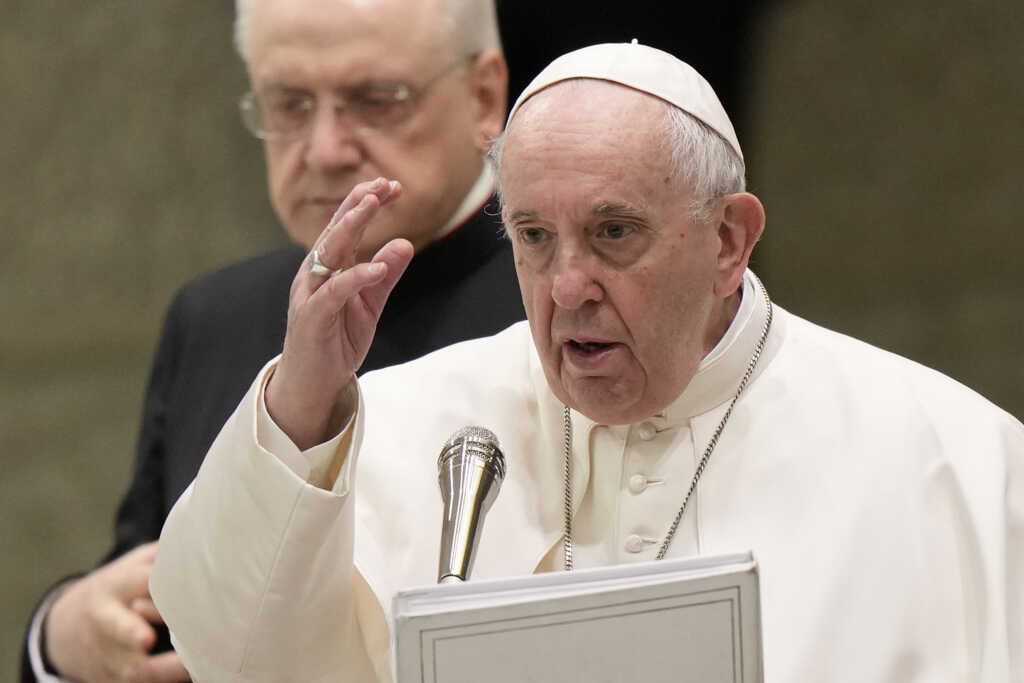Coming off the heels of his criticism of “watered-down secularism” as it pertained to Christmas, Pope Francis is condemning cancel culture as fundamentally at odds with human existence.
“Cancel culture is invading many circles and public institutions,” the 84-year-old pontiff said during an address Monday before the Vatican’s Diplomatic Corps. “As a result, agendas are increasingly dictated by a mindset that rejects the natural foundations of humanity and the cultural roots that constitute the identity of many people.”
The Merriam-Webster Dictionary defines cancel culture as “the practice or tendency of engaging in mass canceling as a way of expressing disapproval and exerting social pressure.”
In the end, though, cancel culture does little more than erode diversity and individual identity, the pope warned.
“Under the guise of defending diversity, it ends up canceling all sense of identity, with the risk of silencing positions that defend a respectful and balanced understanding of various sensibilities,” he explained, furthermore condemning a “one-track thinking” that ignores the gradations of history, often forcing people to rewrite the things of the past “in terms of present-day categories.”
“Any historical situation must be interpreted in the light of a hermeneutics of that particular time — not that of today,” he said, adding, “Multilateral diplomacy is thus called to be truly inclusive, not canceling but cherishing the differences and sensibilities that have historically marked various peoples.”
A damaging consequence of cancel culture is a deep-seated distrust of one another. But in order for world leaders and people from different countries and cultures to come together to combat common causes, there has to be “reciprocal trust and willingness to dialogue,” Pope Francis said, noting said trust requires “listening to one another, sharing different views, coming to agreement, and walking together.”
Ultimately, the pope said, there are certain higher values that should usurp time and space.
“Here I wish to mention in particular the right to life, from conception to its natural end, and the right to religious freedom,” the Catholic leader stated.
Pope Francis has been outspoken in his condemnation of cancel culture recently.
In early December, he rebuked the European Commission after leaked internal documents purportedly revealed the body was urged to make its communications more inclusive during the holiday season by “avoid[ing] assuming that everyone is Christian” and celebrates Christmas.
The document encouraged commission members to use nondescript “holiday” greetings rather than wishing people “Merry Christmas.” It also cautioned against using names “that are typically from one religion,” such as “Maria and John,” telling members to substitute hypothetical couple names with “Malika and Julio,” for example.
At the time the document was leaked, Pope Francis criticized the guidelines as akin to the rhetoric used by dictators.
“In history many, many dictatorships have tried to do this kind of thing,” he said, according to CBN News. “Think of Napoleon… think of the Nazi dictatorship, the communist one. It is something that throughout history hasn’t worked.”
He went on to say the European Union ought to be “careful not to take the path of ideological colonization, which could end up dividing countries and causing the European Union to fail.”
“The danger is when there is a superpower that dictates economic, cultural, and social behavior to the other countries,” the pope said. “Democracy is weakened when national values are sacrificed, are watered down toward an empire, a kind of supranational government.”
***As the number of voices facing big-tech censorship continues to grow, please sign up for Faithwire’s daily newsletter and download the CBN News app, developed by our parent company, to stay up-to-date with the latest news from a distinctly Christian perspective.***



